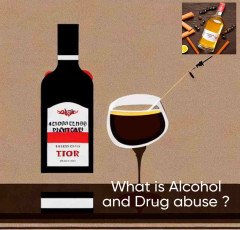
What is Alcohol and Drug abuse ?

The misuse or excessive consumption of drugs that have the ability to change a person's mental and physical state is referred to as alcohol and drug abuse.
Abuse of alcohol refers to drinking too much alcohol to the point where it starts to have a negative impact on a person's relationships, work, and social life.
It may result in liver illness, cardiac issues, anxiety, depression, and other mental health issues.
Drug abuse is the term used to describe the use of prescription or illicit pharmaceuticals for purposes other than those intended by healthcare providers or in excess of advised dosages. Drug misuse can result in addiction, issues with one's physical and emotional well-being, problems with money, and legal troubles.
Abuse of alcohol and other drugs can have negative effects on a person's physical, mental, and social wellbeing as well as on others in their immediate environment, such as friends and family. Those who are battling with alcohol or drug misuse should seek expert assistance and support.
Addiction, a chronic and recurrent brain condition defined by obsessive drug or alcohol seeking and use despite negative effects, can result from both alcohol and drug usage.
A variety of physical, behavioral, and psychological symptoms may be present in people with substance addiction issues.
Tremors, sweating, nauseousness, vomiting, and seizures are a few examples of physical symptoms. Among the behavioral signs are dangerous behavior, theft, and lying. Depression, anxiety, mood swings, and impatience are examples of sychological symptoms.
Behavioral therapy, cognitive-behavioral therapy, and medication-assisted therapy are common combinations of therapies used to treat alcohol and drug abuse.
Support groups like Alcoholics Anonymous (AA) or Narcotics Anonymous (NA) may also be a part of treatment.
The road to recovery can be difficult and necessitates a dedication to long-term sobriety, therefore it is crucial for
individuals who are battling with alcohol or drug misuse to get professional help and support. Family and friends should also get help for themselves because they can be impacted by the person's substance usage.
In order to lower the prevalence of alcohol and drug abuse, prevention is essential.
The application of legislation and regulations, the implementation of education and awareness campaigns, the availability of substance abuse treatment, and the promotion of healthy coping are all examples of prevention tactics.
Campaigns for education and awareness can support the promotion of healthy habits and lifestyles while raising knowledge of the dangers and repercussions of alcohol and drug addiction. Age restrictions on alcohol and drug purchases, for example, can help limit access to the availability of these substances. Having access to addiction treatment options like detoxification, rehabilitation, and support groups can help those who are battling with addiction get the care and assistance they need to become sober and keep it that way.
The risk of substance abuse can be decreased and general wellbeing can be enhanced by encouraging good coping methods and lifestyle choices like exercise, meditation, and positive social interactions.
The misuse or excessive consumption of drugs that have the ability to change a person's mental and physical state is referred to as alcohol and drug abuse.
The effects on a person's physical, emotional, and social wellbeing can be severe and can result in addiction. Reducing the prevalence of substance abuse requires both professional support and help-seeking as well as prevention measures.
Furthermore, it's critical to remember that alcohol and drug abuse can affect people of all ages, genders, races, and socioeconomic levels.
The emergence of substance misuse issues can be influenced by elements like genetics, environment, and social influences.
It's critical to get support if you or someone you love is battling with alcohol or drug misuse.
A person's ability to overcome addiction and enhance their general wellbeing can be helped by treatment and assistance. For those battling addiction, there are numerous options accessible, including medical professionals, support groups, and neighborhood organizations.
Always keep in mind that rehabilitation is a process and there can be obstacles along the road. However, people can attain and maintain sobriety and enhance their quality of life with dedication, support, and a willingness to make constructive adjustments.
To combat the stigma associated with drug and alcohol abuse.
In addition to preventing people from seeking support and assistance, stigmatization can also make people feel isolated and ashamed.
It's critical to remember that addiction is an illness, and those who battle it deserve our compassion, understanding, and support.
A "one size fits all" method of treating alcohol and drug abuse does not exist.
Based on their unique needs and circumstances, each person may need a customized approach to treatment. This could be a mix of counseling, medication-assisted therapy, and support groups.
Abuse of alcohol and other drugs can have detrimental effects on a person's physical, emotional, and social wellbeing.
In order to lower the prevalence of substance usage, it is essential to seek professional assistance and support as well as preventative measures. It's critical to address the stigma associated with addiction and acknowledge that each patient may require a unique treatment plan.
It should be noted that those who are battling with alcohol and drug abuse might benefit much from the assistance of family and friends.
This could entail offering emotional support, supporting therapy and rehabilitation efforts, and establishing boundaries to stop enabling behaviors.
Family and friends might also look for assistance for themselves, perhaps by going to support meetings for those who care about addicts and their families. This can offer a secure and encouraging setting where individuals can exchange stories and get advice on how to effectively help a loved one while also looking after their own well-being.
Alcohol and drug misuse must be addressed holistically, with education, prevention, treatment, and support.
Addicts can attain and sustain a healthy and rewarding life in recovery with a dedication to sobriety and help from medical professionals, loved ones, and community resources.
It is important to keep in mind that some people might not be aware that they have a problem with alcohol or drug usage, or they could be reluctant to ask for treatment because they feel ashamed of it. Interventions can be required in these situations to help the person comprehend the seriousness of their substance usage and the necessity of treatment.
Interventions entail confronting the person about their substance abuse and urging them to get help from a group of family members, friends, and medical experts. Interventions are frequently led by a trained interventionist, who can assist in preparing family and friends and offer support both during and after the procedure.
It's crucial to remember that interventions should never entail coercion or threats and should only be carried out by qualified specialists.
Interventions should be carried out in a sympathetic and supportive manner with the intention of motivating the person to seek treatment and start their road to recovery.
Abuse of alcohol and other drugs can have detrimental effects on a person's physical, emotional, and social wellbeing, therefore it's critical to get expert support and help when necessary. Individuals fighting addiction can benefit greatly from the support of family and friends, and interventions may be required in some circumstances. Addicts can achieve and maintain a healthy and sober lifestyle with a dedication to sobriety and assistance from family members, friends, and community services.
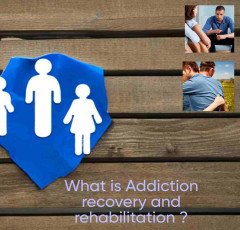
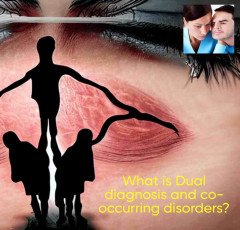

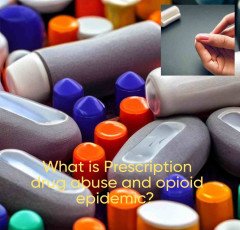

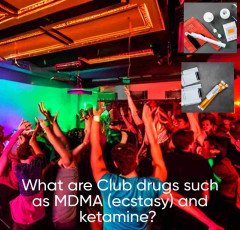









 SEO Checklist
SEO Checklist  RPM 3.0
RPM 3.0  ASPINAL LONDON
ASPINAL LONDON  Best Robotic Vacuum Cleaners
Best Robotic Vacuum Cleaners  Unreal Engine 5 For Beginners Learn The Basics Of Virtual Production
Unreal Engine 5 For Beginners Learn The Basics Of Virtual Production  ASUS Laptop
ASUS Laptop  One World Collection
One World Collection  TitTok Revolution
TitTok Revolution  Smart Doorbell
Smart Doorbell  Only For The United States
Only For The United States  Acer Laptop
Acer Laptop  Top Rated From Amazon
Top Rated From Amazon  The Secret Email System
The Secret Email System  NordPass
NordPass  NordVPN
NordVPN  Artificial Intelligence
Artificial Intelligence  1150+Trendy kids coloring pages Bundle
1150+Trendy kids coloring pages Bundle  Graphics & Design
Graphics & Design  NordLocker
NordLocker  Hello Theme
Hello Theme  Best Selling Books
Best Selling Books  Sennheiser
Sennheiser  Online Technology Classes
Online Technology Classes  Unlimited access to classes on illustration, photography, design, film, music
Unlimited access to classes on illustration, photography, design, film, music  SOFAS
SOFAS  Hot Bags For Pain Relief
Hot Bags For Pain Relief  Best Home Appliances
Best Home Appliances  Creative Brief For Video Shoot
Creative Brief For Video Shoot  Favorite Company (Cuelinks)
Favorite Company (Cuelinks)  Amazon Best Selling Products
Amazon Best Selling Products  Best Sellers On Amazon
Best Sellers On Amazon  ELECTRONIC ACCESSORIES
ELECTRONIC ACCESSORIES  The Click Engine
The Click Engine  Online Marketing
Online Marketing  Men Clothing
Men Clothing  Women Fashion
Women Fashion  All Wireless Products
All Wireless Products  BEST SELLER TOP10
BEST SELLER TOP10 
















